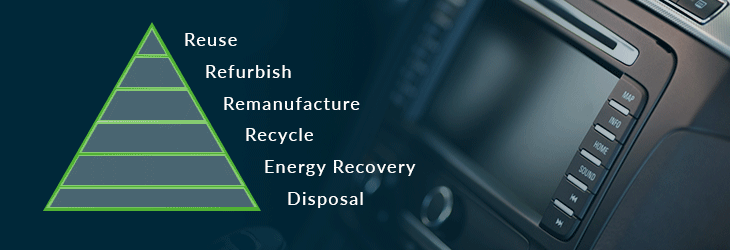Automotive electronics remanufacturing is good for the environment, because it reduces waste, helps eliminate improper disposal of toxins, and can even have lasting impacts on global warming.
Compared to the alternatives - material recycling, and manufacturing new products - remanufacturing of electronic components has positive environmental impacts that should be important when considering end-of-life options for electronics.
End-of-Life Hierarchy

According to one Swedish study, positive environmental impacts of remanufacturing can include alleviation of resource depletion, “reduction of global warming potential and chances to close the loop for safer handling of toxic materials.”
Remanufacturing Stops Resource Depletion
Building everything new, every time, means using a lot of resources. From oil, to plastic to water, and any number of natural and manmade resources, manufacturing rapidly eats up inputs. Considering remanufacturing as a solution for end-of-life is a smart choice for stopping resource depletion.
Remanufacturing Can Help Reduce Global Warming
Industrial carbon burning is one of the leading causes of global climate change. The United States EPA has reported that the industrial sector contributes nearly 20% of global greenhouse emissions. Remanufacturing helps reduce this impact. In fact, according to Afrinaldi et al (2017), “remanufacturing results in a 67% savings in global warming potential.”
Resources:
Afrinaldi, Feri et al. (2017). “The advantages of remanufacturing from the perspective of
eco-efficiency analysis.” ScienceDirect, Procedia CIRP 61:223-228.
Sundin E. and Lee H.M. (2012). “In what way is remanufacturing good for the environment?” in
Matsumoto M., Umeda Y., Masui K., Fukushige S. (eds). Design for Innovative Value
Towards a Sustainable Society. Springer, Dordrecht.
US EPA. Global greenhouse gas emissions data. Retrieved on May 16, 2017.


